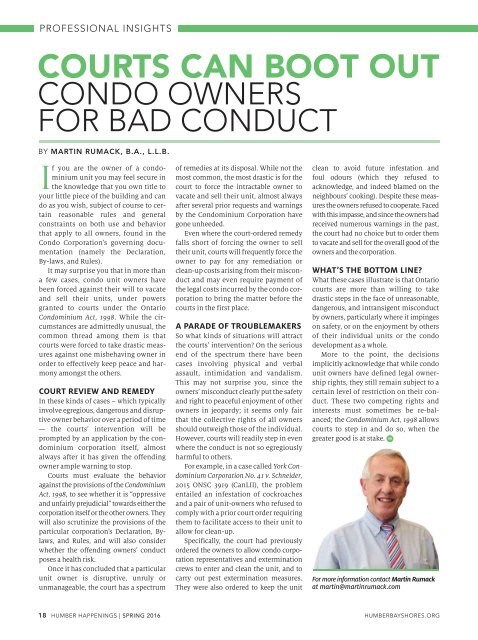Humber-Happenings-Magazine-Spring-2016
You also want an ePaper? Increase the reach of your titles
YUMPU automatically turns print PDFs into web optimized ePapers that Google loves.
PROFESSIONAL INSIGHTS<br />
COURTS CAN BOOT OUT<br />
CONDO OWNERS<br />
FOR BAD CONDUCT<br />
BY MARTIN RUMACK, B.A., L.L.B.<br />
If you are the owner of a condominium<br />
unit you may feel secure in<br />
the knowledge that you own title to<br />
your little piece of the building and can<br />
do as you wish, subject of course to certain<br />
reasonable rules and general<br />
constraints on both use and behavior<br />
that apply to all owners, found in the<br />
Condo Corporation’s governing documentation<br />
(namely the Declaration,<br />
By-laws, and Rules).<br />
It may surprise you that in more than<br />
a few cases, condo unit owners have<br />
been forced against their will to vacate<br />
and sell their units, under powers<br />
granted to courts under the Ontario<br />
Condominium Act, 1998. While the circumstances<br />
are admittedly unusual, the<br />
common thread among them is that<br />
courts were forced to take drastic measures<br />
against one misbehaving owner in<br />
order to effectively keep peace and harmony<br />
amongst the others.<br />
COURT REVIEW AND REMEDY<br />
In these kinds of cases – which typically<br />
involve egregious, dangerous and disruptive<br />
owner behavior over a period of time<br />
— the courts’ intervention will be<br />
prompted by an application by the condominium<br />
corporation itself, almost<br />
always after it has given the offending<br />
owner ample warning to stop.<br />
Courts must evaluate the behavior<br />
against the provisions of the Condominium<br />
Act, 1998, to see whether it is “oppressive<br />
and unfairly prejudicial” towards either the<br />
corporation itself or the other owners. They<br />
will also scrutinize the provisions of the<br />
particular corporation’s Declaration, Bylaws,<br />
and Rules, and will also consider<br />
whether the offending owners’ conduct<br />
poses a health risk.<br />
Once it has concluded that a particular<br />
unit owner is disruptive, unruly or<br />
unmanageable, the court has a spectrum<br />
of remedies at its disposal. While not the<br />
most common, the most drastic is for the<br />
court to force the intractable owner to<br />
vacate and sell their unit, almost always<br />
after several prior requests and warnings<br />
by the Condominium Corporation have<br />
gone unheeded.<br />
Even where the court-ordered remedy<br />
falls short of forcing the owner to sell<br />
their unit, courts will frequently force the<br />
owner to pay for any remediation or<br />
clean-up costs arising from their misconduct<br />
and may even require payment of<br />
the legal costs incurred by the condo corporation<br />
to bring the matter before the<br />
courts in the first place.<br />
A PARADE OF TROUBLEMAKERS<br />
So what kinds of situations will attract<br />
the courts’ intervention? On the serious<br />
end of the spectrum there have been<br />
cases involving physical and verbal<br />
assault, intimidation and vandalism.<br />
This may not surprise you, since the<br />
owners’ misconduct clearly put the safety<br />
and right to peaceful enjoyment of other<br />
owners in jeopardy; it seems only fair<br />
that the collective rights of all owners<br />
should outweigh those of the individual.<br />
However, courts will readily step in even<br />
where the conduct is not so egregiously<br />
harmful to others.<br />
For example, in a case called York Condominium<br />
Corporation No. 41 v. Schneider,<br />
2015 ONSC 3919 (CanLII), the problem<br />
entailed an infestation of cockroaches<br />
and a pair of unit-owners who refused to<br />
comply with a prior court order requiring<br />
them to facilitate access to their unit to<br />
allow for clean-up.<br />
Specifically, the court had previously<br />
ordered the owners to allow condo corporation<br />
representatives and extermination<br />
crews to enter and clean the unit, and to<br />
carry out pest extermination measures.<br />
They were also ordered to keep the unit<br />
clean to avoid future infestation and<br />
foul odours (which they refused to<br />
acknowledge, and indeed blamed on the<br />
neighbours’ cooking). Despite these measures<br />
the owners refused to cooperate. Faced<br />
with this impasse, and since the owners had<br />
received numerous warnings in the past,<br />
the court had no choice but to order them<br />
to vacate and sell for the overall good of the<br />
owners and the corporation.<br />
WHAT’S THE BOTTOM LINE?<br />
What these cases illustrate is that Ontario<br />
courts are more than willing to take<br />
drastic steps in the face of unreasonable,<br />
dangerous, and intransigent misconduct<br />
by owners, particularly where it impinges<br />
on safety, or on the enjoyment by others<br />
of their individual units or the condo<br />
development as a whole.<br />
More to the point, the decisions<br />
implicitly acknowledge that while condo<br />
unit owners have defined legal ownership<br />
rights, they still remain subject to a<br />
certain level of restriction on their conduct.<br />
These two competing rights and<br />
interests must sometimes be re-balanced;<br />
the Condominium Act, 1998 allows<br />
courts to step in and do so, when the<br />
greater good is at stake. HH<br />
For more information contact Martin Rumack<br />
at martin@martinrumack.com<br />
18 HUMBER HAPPENINGS | SPRING <strong>2016</strong> HUMBERBAYSHORES.ORG


